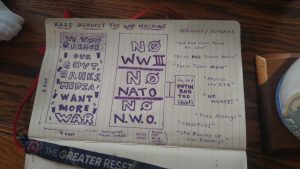The Russian invasion of Ukraine is not our fight
As a staunch anti-war libertarian, I believe that the United States and NATO should stay completely out of the Russia-Ukraine conflict. The situation is complex, with a long history of tensions and conflicting interests. While it’s true that Russia invaded Ukraine to prevent NATO expansion, it’s not our fight. The American empire should not be intervening in every conflict around the world, especially when it’s not in our national interest.
It’s important to understand that military intervention comes with a high cost. The United States has been involved in countless wars over the past few decades, and the results have not been good. We’ve spent trillions of dollars, lost countless lives, and destroyed entire countries. The last thing we need is to get involved in another conflict that doesn’t directly affect us.
The United States has caused tremendous damage—it must not cause any more
Continued sanctions on Russia and arming of Ukraine will only escalate the conflict. Vladimir Putin isn’t losing any sleep over sanctions. He’s comfortable in his palace. Sanctions are an act of war, and they primarily harm innocent civilians, already suffering due to the conflict. Arming Ukraine will only provoke Russia and prolong the conflict.
The best option in this situation is the best option in every situation: Keep the United States government out of it. A strict policy of non-intervention will lead to a swift end to the violence and allow some sort of equilibrium to take hold.
Remember when the US (mostly) minded its own business?
As Libertarians, we promote peace and, where it will be helpful, diplomacy. First articulated by President James Monroe in 1823, the Monroe Doctrine carried the day for U.S. international relations up to World War 1. Primarily a defensive stance, the Monroe Doctrine stated that the United States would not tolerate any further European colonization or intervention in the Western Hemisphere. Any such intervention was to be considered a threat to U.S. national security. The Doctrine was intended to protect U.S. interests in the Western Hemisphere, prevent the spread of European influence, and establish the United States as the dominant power in the region. The Monroe Doctrine, while not strictly noninterventionist, also lent tacit disapproval to U.S. intervention outside our hemisphere. While this is emphatically not a Libertarian solution, it is far better than the so-called Liberal Internationalism that has united Western Europe and the United States against the world since the Progressive Era.
The Monroe Doctrine is far from ideal. The doctrine of “manifest destiny” emerged directly from it, after all. In 1904, Liberalist president Theodore Roosevelt established was was known as the Roosevelt Corrollary, an addition to (and certainly not a corollary to) the Monroe Doctrine. The Roosevelt Corollary essentially established the United States government as the police force of the western hemisphere. This Liberal interventionism paved the way for Wilson’s campaign promise-breaking entry into World War 1, setting the stage for the United States to perform as the fumbling, bumbling World Police for the next century. The “rules-based international order” is, of course, a thinly-veiled U.S.-led and NATO-enforced empire. The fall of the Monroe Doctrine created the bloodiest century in human history.
On the other hand, the Monroe Doctrine is compatible with the Realist school of international affairs, which holds that nations exist in a state of anarchy. Where there is no overarching authority to enforce rules and regulations, nations (and, for that matter, individuals) are forced to cooperate. States must prioritize their own self-interest and be prepared to use force to protect their sovereignty and interests, while not using force to encroach upon the sovereignty of others. For all its faults and unforeseen consequences, the Monroe Doctrine created a Western Hemisphere free from external threat for 200 years. This might be the best we can hope for, given the world as it is.
A Russian Monroe Doctrine?
Foreign policy always has unintended consequences. The more violent and costly the intervention, the more drastic and deadly those consequences are. The sad fact is, the United States hasn’t been victorious in a major war since World War 2. As in the case of the ever-more-likely World War 3, the United States had imposed sanctions on its arbitrarily-defined, threatless “enemies” in Japan for decades (provoking the attack on Pearl Harbor, according to many historians) and supplied the Allies with weapons for years before entering the fray with boots on the ground. Unlike Europe, the U.S. military was relatively unscathed on December 11, 1941. The victory in Europe and the unnecessary nuking of Hiroshima and Nagasaki were cheaply-won by the United States, and we’ve had little military success since then, aside from a few quick regime changes and “police actions” (the most notorious of which, in Vietnam, was lost handily).
Let’s not allow our overlords in Washington to make these bad decisions again. We must encourage economic and cultural ties between the Russia and the West, rather than engage in a pointless and costly conflict.
The surest path to peace is to recognize Russia as a world power with a seat at the diplomatic table and a sphere of influence in its region. I maintain that a Russian version of the Monroe Doctrine, while certainly not ideal, would give the best chance at lasting peace in the region and prevent a third world war. The United States government and its vassal states in Europe should be encouraging negotiations between Russia and Ukraine to reach a peaceful resolution. To do this, of course, the American Empire would be forced to accept the fact that a unipolar world simply cannot last.
We as Libertarians echo Thomas Jefferson in calling for “peace, commerce, and honest friendship with all nations, entangling alliances with none.” We must promote liberty and self-determination among nations, just as we do among individuals. There is very likely never to be a large nation-state that is also libertarian. Many, myself included, would hold those concepts to be self-contradictory, in fact. The idea of a “libertarian state” makes as much sense as a “citrus carrot”. We can either continue denying this fact and as we shake our fists at the heavens, or we can live in the real world and accept that, as long as nation-states exist, and as long as hierarchy among nation-states exists just as it does among people, the natural course of action is almost always the best course.
The United States government must stand down from its imperial ambitions before it destroys the entire world through its hubris. How many more lives must be lost before this common sense solution becomes reality? This is the most important political “issue” in history.
Join us at the rally
I urge all Libertarians and Minnesotans of good will to join the Rage Against the War Machine rally this Sunday from 2 PM – 3 PM at MayDay Plaza in Minneapolis. This is a sister rally to the one being co-hosted by the National LP in Washington DC this weekend.
It’s time to send a message to the American empire that we will not support endless wars and interventions around the world. It’s time to focus on our own country and our own problems, and leave other countries to sort out their own affairs. In the end, liberty isn’t something you ask for. It’s something you create. Let’s create a world of peace and freedom, starting with our own actions and words.
RSVP for the rally on Facebook here. Or simply show up! Details follow.

What: Rage Against the War Machine
Where: Mayday Plaza, 301 Cedar Avenue South, Minneapolis, MN
When: Sunday, February 20, 2023, 2:00 – 3:00 PM Central
More info on the Rage Against the War Machine national rally here.
James Jenneman is a Libertarian activist, entrepreneur, and retired podcaster in Minneapolis.
The views expressed by individual authors at LPMN.org do not necessarily reflect the views of the Libertarian Party of Minnesota, its membership, or its leadership.
